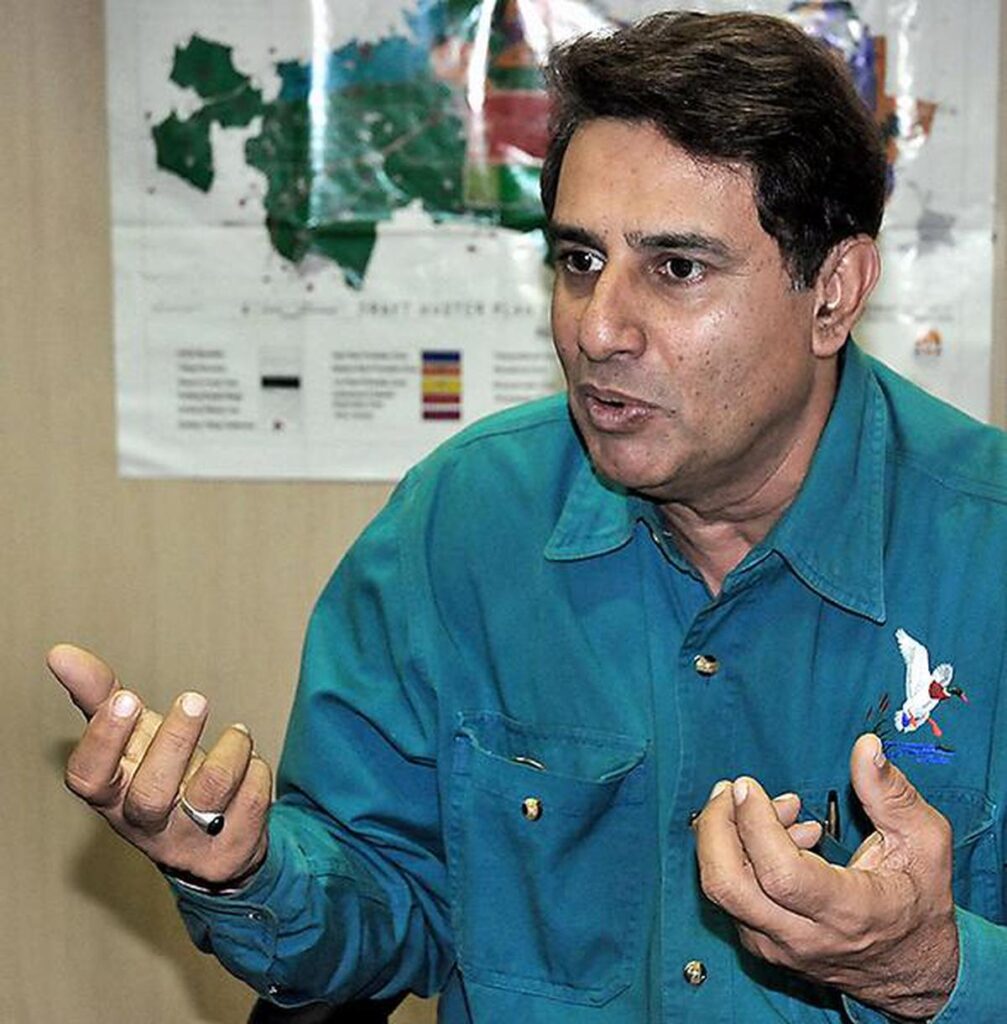Hyderabad, TELANGANA :
Nawab Shafath Ali Khan trains guns to save endangered species

Nawab Shafath Ali Khan Photo: K. Ramesh Babu
No arrogance, no laid back attitude or flaunting his privileged birth. This new age nawab is a quick draw. He can handle physical and mental strain; evidenced by the fact that he can sit motionless for hours at a stretch atop a 20 ft high machan in thick jungle with danger lurking close by.
Nawab Shafath Ali Khan, India’s celebrated hunter refuses to conform to the typical nawabi lifestyle. He doesn’t live in the lap of luxury, instead he loves to wallow in the lap of nature. He displays an unusual obsession for wildlife, conservation and guns.
At his villa in Hyderabad, stuffed trunks, elephant leg footstools and a bison leg pen-stand greet you. Then you are suddenly jolted when a trumpet rings from his mobile. His daily fare at Nilgiri Hills, Masinagudi village to be precise, where he usually stays, include a sighting of spotted deer, sambar, the piercing call of lapwings, chatter of macaques and the occasional roar of a tiger on the prowl. Sure, he is at ease with the sounds, sights and life in the jungles of south India where he has spent most of his 58 years.
Hunting runs into his genes. His grandfather, Nawab Sultan Ali Khan Bahadur, was an honorary elephant hunter for British India while his father, Nawab Arshad Ali Khan, was a target shooter, doyen of horse racing and secretary of Bangalore Turf Club. “I have inherited the love of wildlife and knowledge of flora and fauna from my ancestors,” says Shafath Ali.
At an age when most children love to play with toys, he played with weapons. Those days the nobility was exempted from the Arms Act, and there were 50 odd weapons at his house. No wonder he got a trophy for rifle shooting from the Governor of Madras in 1962 when he was just five years. At 10 he shot a spotted deer in Masinagudi. Since then he has been active in competitive rifle shooting. “Those days game licences were given and hunting blocks allotted. But there was strict code which hunters had to follow,” says Shafath Ali, fresh from the successful tranquillising of a man-eater tigress in Brahmapuri division of Maharashtra.
The only authorised tranquillising expert and culling officer in India, Shafath Ali is always at the beck and call of the forest departments of Bihar, Jharkhand, Madhya Pradesh, Himachal Pradesh, Karnataka and Telangana. If he is not tackling man-eating leopards, rogue elephants, stray tigers and sloth bear, he is training the frontline staff of the forest departments in the use of tranquillising dart gun on stressed tigers and leopards.
The dangerous missions he undertakes are a test of endurance. To work in close proximity of a man eater is perhaps the most dangerous sport. But for the last four decades it has been a way of life for Shafath Ali. “Tears of gratitude that I see in the eyes of poor farmers and forest dwellers give me energy and courage,” he says.
But he couldn’t have handled these death-defying feats without the support of his family. His wife, Begum Shaheen, stands by him with patience and understanding while son, Asghar Ali Khan, is ready to step into his shoes. The duo keep the fire burning at Safari Land Resorts, the family’s chain of restaurants at Ooty even as Shafath Ali is busy answering the call of the wild.
The sharp shooter often finds wildlife activists training guns at him for his trigger-happy ways. “Culling is a tool of conservation,” he explains. The Wildlife Tranqui Force set up by Hitesh Malhotra, head of Forest Force, Andhra Pradesh, of which he is a secretary, is intended to improve wildlife management through tranquillising and safe rescue of endangered animals.
Scientific management of wildlife population, he says, calls for evolving a strategy to deal with excessive wildlife. This is the only way to check the escalating man-animal conflict. It’s not whether animals will survive, it’s whether man has the will to save them. Save it to cherish or leave it to perish.
source: http://www.thehindu.com / The Hindu / Home> News> Cities> Hyderabad> Interview / by J S Ifthekhar / July 27th, 2017








